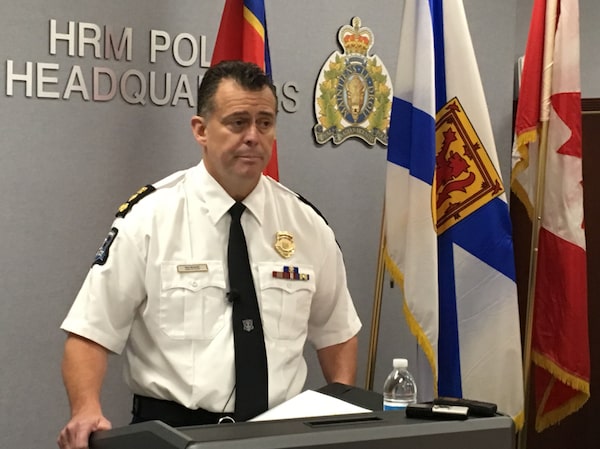
Halifax Regional Police Chief Daniel Kinsella is seen in an Oct. 10, 2019, file photo. Kinsella has set the date for a formal apology to Nova Scotia's black community over the practice of street checks.Keith Doucette/The Canadian Press
Halifax’s police chief says he will issue a formal apology to Nova Scotia’s black community over the practice of street checks at a Nov. 29 event and outline “meaningful action” to follow.
Chief Daniel Kinsella’s announcement comes as Montreal unanimously adopted a motion Monday night calling for a stop to the practice by police officers there, with the councillor behind the motion citing Halifax as an example of leadership.
“In Halifax, faced with a similar situation, Mayor Mike Savage showed a great deal of political leadership in saying, ‘It stops now,’ and decreed a moratorium and told police, ‘You aren’t stopping anybody until we have clear rules in place that will stop checks based on simply a hunch or suspicion or you’re in a high-crime neighbourhood,” Coun. Marvin Rotrand said in an interview before his motion was adopted.
The Montreal motion is not binding, because the city’s police force answers to the provincial Public Security Department, not city hall. The motion calls on the police to “immediately stop unfounded street checks” and asks the provincial government to adopt legislation regulating police stops across Quebec.
It also calls on Montreal city council to ensure police respect their commitment to come up with a new street check policy by March. City police promised to revise their procedures following the release last month of an independent report finding evidence of “systemic bias” in the way Montreal police stop citizens to check ID.
The report found Indigenous women were 11 times more likely to be questioned than white women. Overall, black and Indigenous Montrealers were between four and five times more likely to be subjected to the street checks, which have been defined as stopping citizens without specific reason and recording their personal information.
“It’s unacceptable that any citizen should fear being stopped in our streets simply because of their racial or ethnic origin,” Rotrand said. “This is Canada in 2019; this is not Canada in 1919.”
In Halifax, Kinsella outlined his plan to the city’s board of police commissioners on Oct. 21, saying African Nova Scotians have endured generations of inequity and street checks deepened the divide between police and the community. Kinsella said it would take time to improve the police force’s relationship with the black community.
He has called for better training of officers and said he will ensure that all complaints of improper police street checks are reported directly to him. He plans to elaborate on his plan at the Nov. 29 event at the Halifax Central Library.
The Nova Scotia government announced it would permanently ban the practice after retired chief justice Michael MacDonald issued a formal opinion that it is illegal as practised in Nova Scotia. MacDonald’s analysis concluded the practice contravenes citizens’ constitutional and common law rights.
Our Morning Update and Evening Update newsletters are written by Globe editors, giving you a concise summary of the day’s most important headlines. Sign up today.